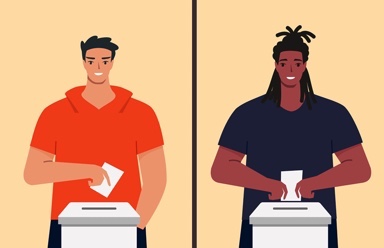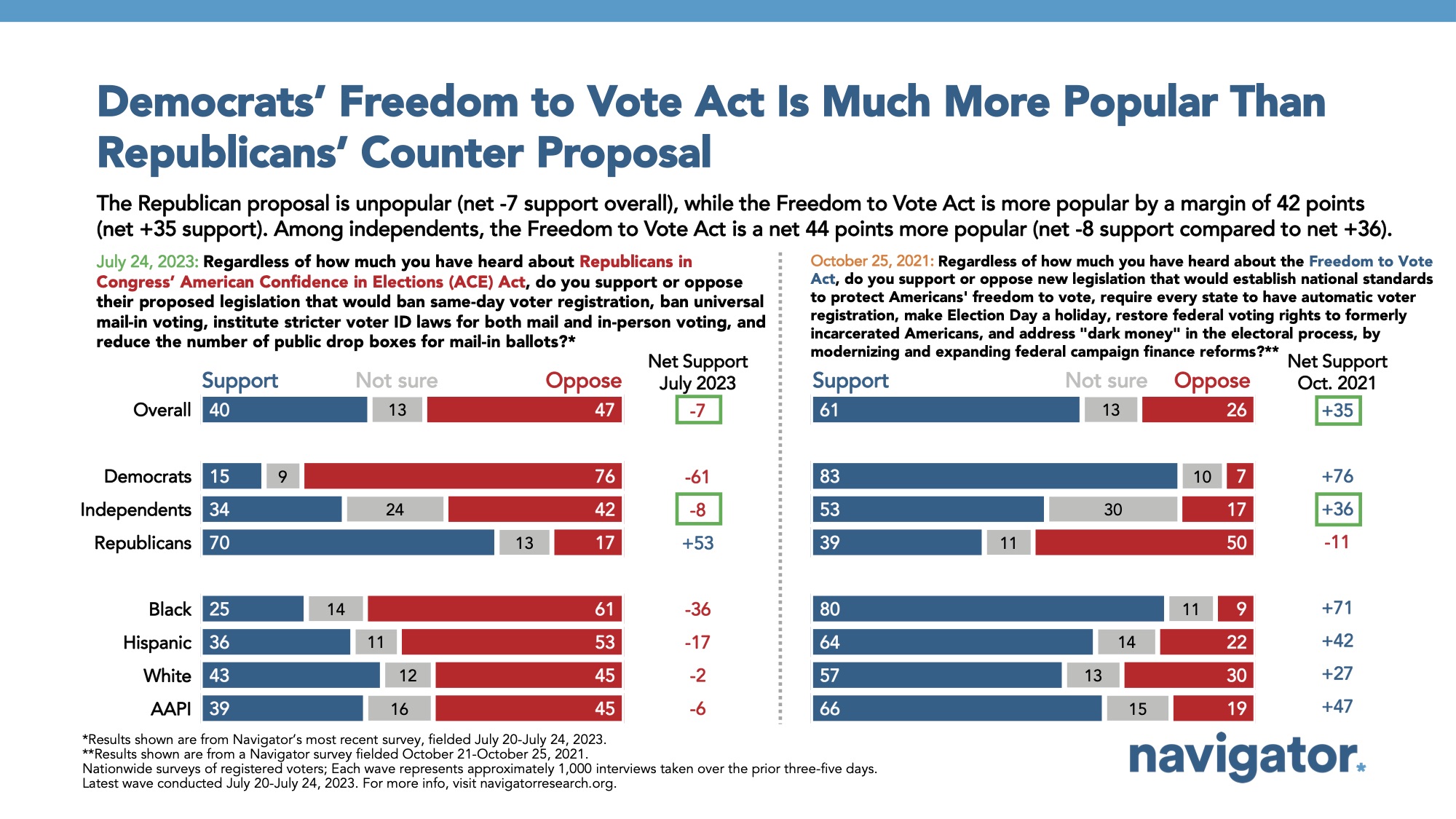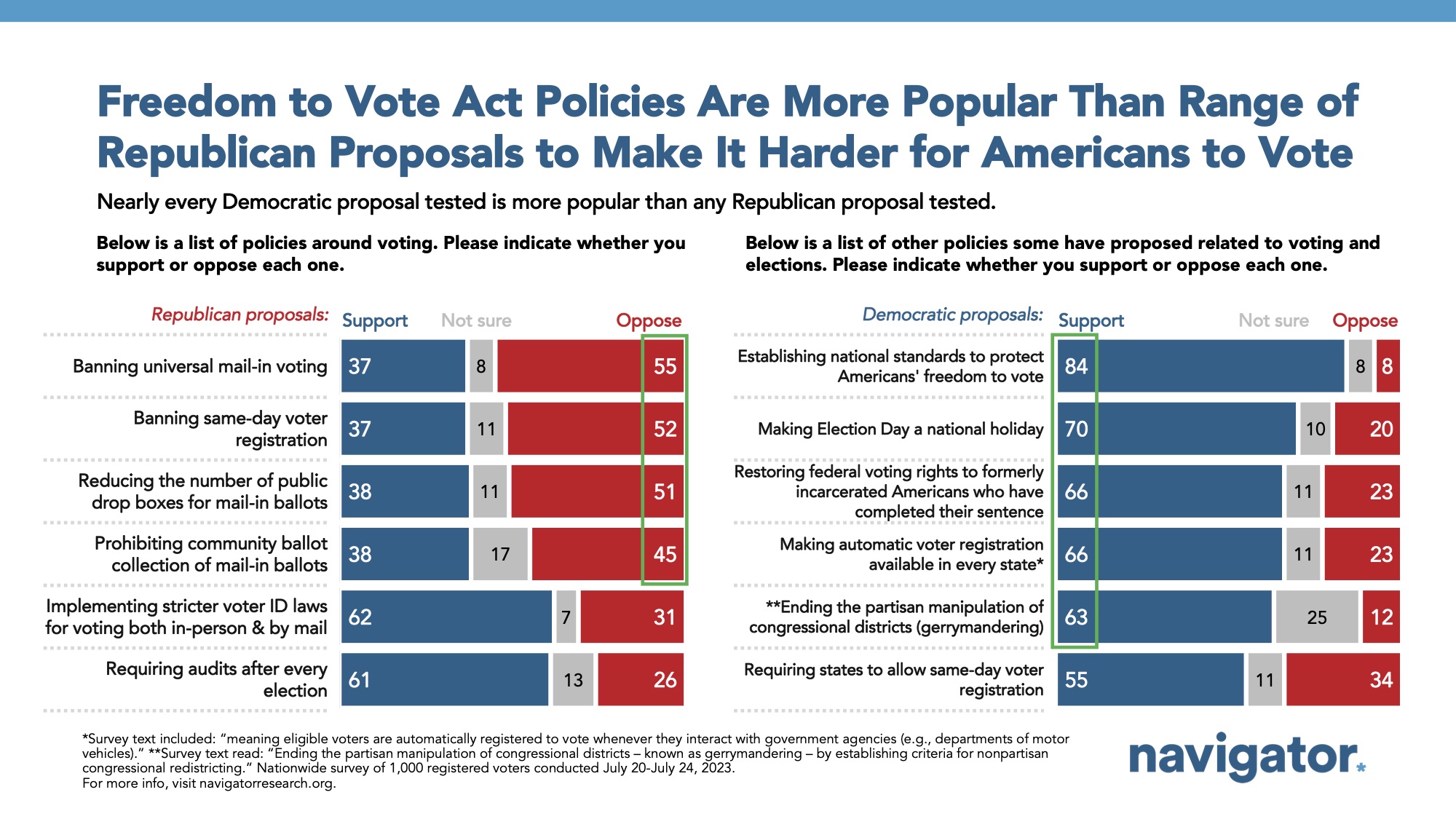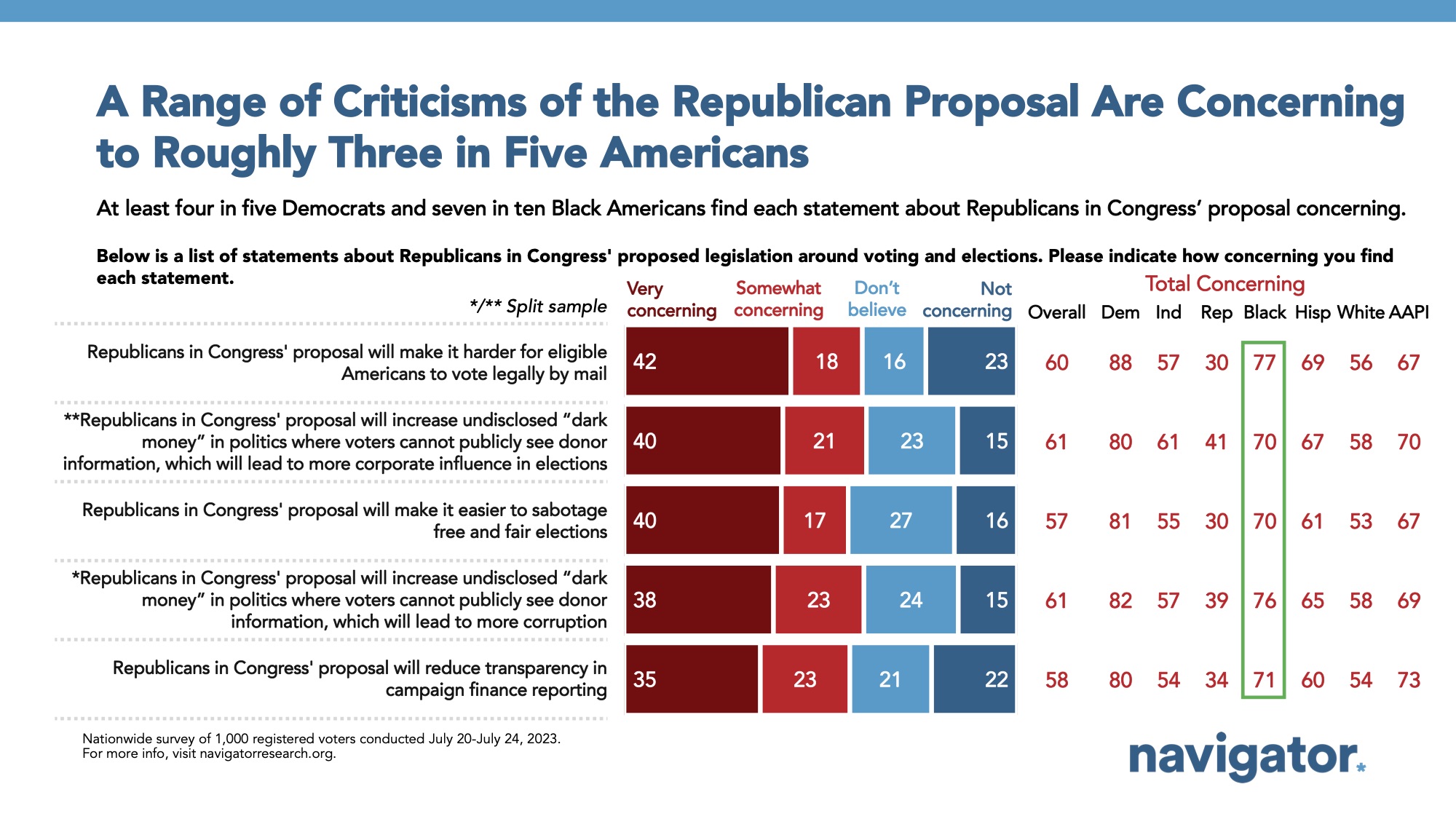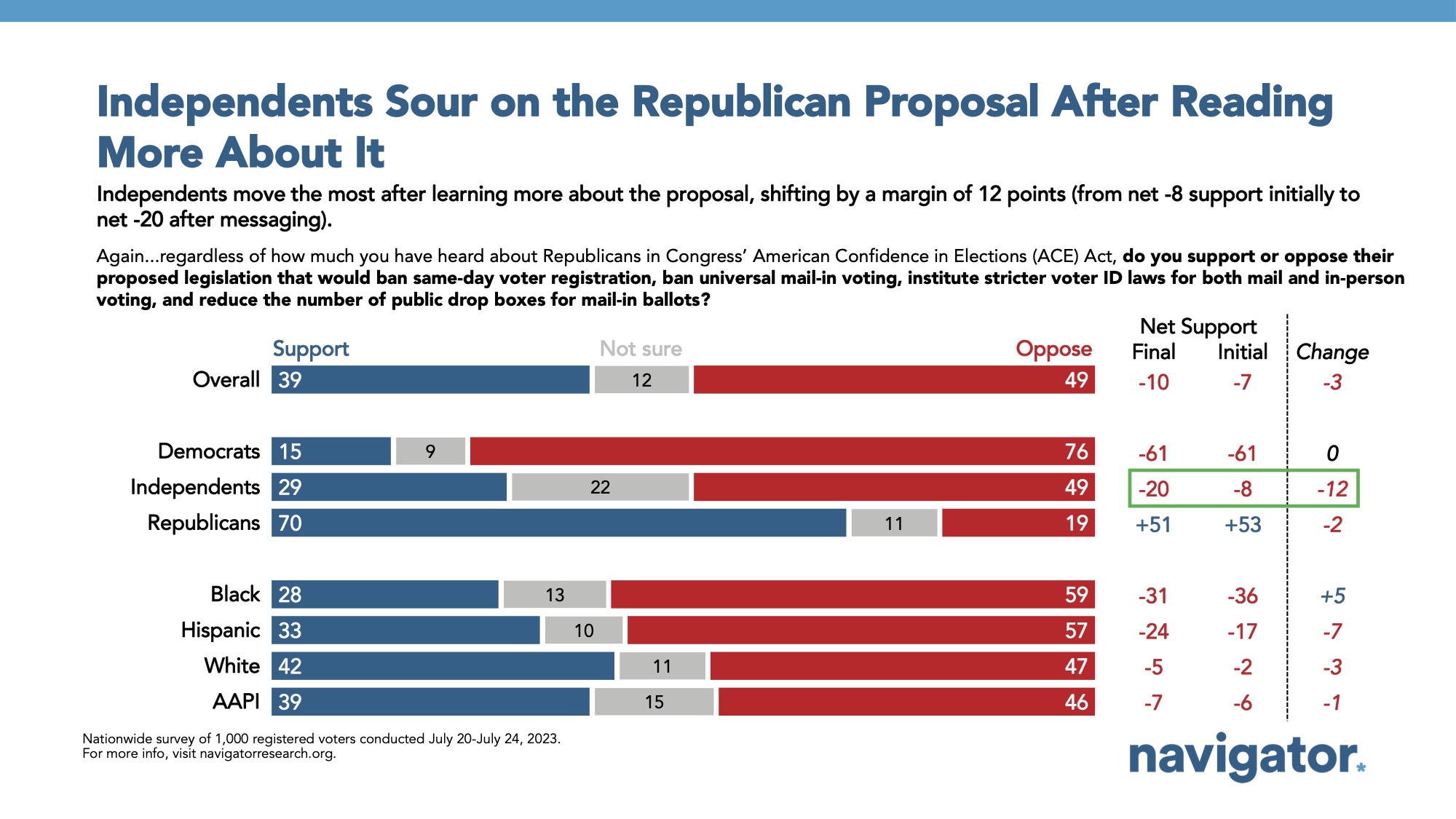Democracy Proposals: A Guide for Advocates
This Navigator Research report contains polling data on Americans’ latest perceptions of voting rights legislation being proposed in the country, including which legislative provisions are most supported and which provisions Americans find most concerning.
More Americans oppose the Republican-proposed American Confidence in Elections Act than support it, as opposition grows when Americans learn details about the legislation.
The newly introduced Republican elections bill (American Confidence in Elections (ACE) Act) is already underwater among Americans, including among independents and non-white Americans. By a 7-point margin, Americans oppose the ACE Act when described as a bill that would “ban same-day voter registration, ban universal mail-in voting, institute stricter voter ID laws for both mail and in-person voting, and reduce the number of public drop boxes for mail-in-ballots” (40 percent support – 47 percent oppose). Opposition for the legislation is primarily driven by Democrats (net -61; 15 percent support – 76 percent oppose), Black Americans (net -36; 25 percent support – 61 percent oppose), Hispanic Americans (net -17; 36 percent support – 53 percent oppose), and independents (net -8; 34 percent support – 42 percent oppose).
- Conversely, the Freedom to Vote Act — voting rights legislation proposed by Democrats in 2021 and recently reintroduced in the House — is supported by more than three in five Americans when described as “legislation that would establish national standards to protect Americans’ freedom to vote, require every state to have automatic voter registration, make Election Day a holiday, restore federal voting rights to formerly incarcerated Americans, and address ‘dark money’ in the electoral process, by modernizing and expanding federal campaign finance reforms” (net +41; 63 percent support – 22 percent oppose).
Policies that make it harder to vote are least supported, while protecting the freedom to vote is most supported.
A majority of Americans oppose banning mail-in voting and same-day voter registration, but overwhelmingly support establishing national standards to protect Americans’ freedom to vote. Policies aimed at limiting access to voting are deeply unpopular: a majority of Americans oppose banning mail-in voting (net -18; 37 percent support – 55 percent oppose), banning same-day voter registration (net -15; 37 percent support – 52 percent oppose), and reducing the number of public drop boxes for mail-in ballots (net -13; 38 percent support – 51 percent oppose). These policies are deeply unpopular among Black and Hispanic Americans, including banning same-day voter registration (net -43 among Black Americans; net -32 among Hispanic Americans), banning mail-in voting (net -40 among Black Americans; net -30 among Hispanic Americans), and reducing the number of public drop boxes for mail-in ballots (net -40 among Black Americans; net -20 among Hispanic Americans).
- Policies protecting voting rights are immensely popular, including establishing national standards to protect Americans’ freedom to vote (net +76; 84 percent support – 8 percent oppose), making Election Day a national holiday (net +50; 70 percent support – 20 percent oppose), and restoring federal voting rights to formerly incarcerated Americans who have completed their sentence (net +43; 66 percent support – 23 percent oppose).
- Other popular Democratic policies include ending the partisan manipulation of congressional districts – known as gerrymandering – by establishing criteria for nonpartisan congressional redistricting (net +54; 63 percent support – 12 percent oppose), making automatic voter registration available in every state (net +43; 66 percent support – 23 percent oppose), and requiring states to allow same-day voter registration (net +21; 55 percent support – 34 percent oppose).
Americans are most concerned that the proposed voting legislation by Republicans in Congress will make it harder for Americans to vote and increase dark money in politics.
Three in five Americans find it concerning that Congressional Republicans’ proposal “will make it harder for eligible Americans to vote legally by mail” (60 percent concerning, including 40 percent who find this “very” concerning), that it will “increase undisclosed ‘dark money’ in politics where voters cannot publicly see donor information, which will lead to more corporate influence in elections” (61 percent concerning, including 40 percent who find this “very” concerning), that it will “make it easier to sabotage free and fair elections” (57 percent concerning, including 42 percent who find this “very” concerning), and that it will “reduce transparency in campaign finance reporting” (58 percent concerning, including 35 percent who find this “very” concerning).
- After reading the statements about this proposed legislation, opposition increases from net -7 to net -10, with increased opposition driven primarily by independents (from net -8 to net -20; 29 percent support – 49 percent oppose).
About The Study
Global Strategy Group conducted public opinion surveys among a sample of 1,000 registered voters from July 20-July 24, 2023. 99 additional interviews were conducted among Hispanic voters. 67 additional interviews were conducted among Asian American and Pacific Islander voters. 104 additional interviews were conducted among African American voters. 107 additional interviews were conducted among independent voters. The survey was conducted online, recruiting respondents from an opt-in online panel vendor. Respondents were verified against a voter file and special care was taken to ensure the demographic composition of our sample matched that of the national registered voter population across a variety of demographic variables.
